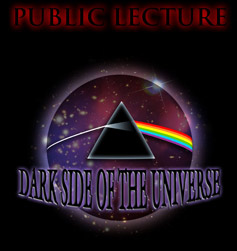

Monday - August 27, 2007
SLAC Today is
available online at:
http://today.slac.stanford.edu
In this issue:
Public Lecture: The Dark Side of the Universe
Dorfan Today: SLAC and the Nation Take Lead on Science Education Initiatives
Summer Intern Takes on EPICS Learning Curve
Safety Firsts
 |
 |
|
Monday - August 27, 2007 |
Public Lecture: The Dark Side of the Universe
Image courtesy of SLAC InfoMedia.
Tomorrow evening at 7:30 p.m., Maruša Bradač of the Kavli Institute for Particle Astrophysics and Cosmology will present the public lecture The Dark Side of the Universe. One of the greatest accomplishments in recent astrophysics is the creation of a model for the complete inventory of the universe. Observational data shows with an extremely high level of certainty that ordinary matter (every particle ever detected by every person who ever lived) makes up only one fifth of all the matter in the universe. The rest goes by the popular name of dark matter. Because it is dark, dark matter has been notoriously hard to detect; it doesn't emit or reflect radiation such as light or heat, and it can have only the feeblest of interactions with itself and ordinary matter. In tomorrow's lecture, Bradač will discuss how she and other astronomers around the world observe this invisible matter. The lecture will take place at 7:30 p.m. in SLAC's Panofsky Auditorium. For more information, visit the SLAC Public Lecture website. |
||
|
|
||
 This time last year I wrote a column about the success of Kids Day at SLAC, and mentioned initiatives that were being discussed to improve science education for young people around the nation. A year later I am delighted to write about the same subject and report on the tremendous progress that has been made. Congress and the Administration have responded generously to the National Academies of Science report Rising Above the Gathering Storm, which recommended much stronger support for K-12 science education and initiatives to ensure that bright young people are drawn into science and engineering at the university level. Earlier this month the President signed into law the America COMPETES Act that includes many initiatives to improve science education. Here are three that I find particularly pleasing: • Create partnerships between National Laboratories and local high-need high schools to establish centers of excellence in math and science education. • Strengthen the skills of thousands of math and science teachers by establishing training and education programs at summer institutes hosted at the National Laboratories and by increasing support for the Teacher Institutes for the 21st Century program at the National Science Foundation. • Assist states in establishing or expanding statewide specialty schools in math and science so that students from across the state will be eligible to attend and providing expert assistance in teaching from National Laboratories' staff at those schools. This is encouraging and motivating news, demonstrating that the government has acted swiftly and wisely in the long term interests of the next generation of scientists, engineers and educators and has recognized the important role that the National Laboratories have to play. SLAC's recently formed Education Office is ready to participate fully in these new projects. Stanford University has also moved boldly, setting up the K-12 Education Initiative to address improvement of K-12 education. The initiative, which is co-led by SLAC's Helen Quinn, is calling for projects that support the professional development of teachers; curriculum development; school leadership and governance; and programs that extend resources and opportunities at Stanford to K-12 students. Again, SLAC's Education Office is one of the principal participants in this initiative. Read more... |
Summer Intern Takes on EPICS Learning Curve
For Power Conversion Engineering (PCE) department summer intern Howard Young, the acronym EPICS stands for more than just Experimental Physics and Industrial Control System. It stands for the massive amounts of work needed to learn and utilize the program. Young is spending this summer working with the PCE department to apply the pre-existing EPICS software—which allows users to monitor hardware—to the various power supplies throughout the site. To achieve this goal, Young has spent every day since arriving from the University of California-Santa Cruz in July working to understand the complex program. Once Young has a firm grasp of EPICS in hand, he will simplify the learning process by breaking it down into an instruction manual for the rest of the department to use. But there's a catch: even some who have spent one or two years with the program are still not experts. "The learning curve with EPICS is steep," said Young. "But I hope to be back next summer to continue helping on this project." The system contains some aspects that can only be fully utilized with ample skills in computer programming. To brush up on programming skills acquired during his Electrical Engineering curriculum, Young has written several programs including a calculator from scratch. He is also developing an interface that meters and graphs incoming data, again from scratch. "Howard is doing a great job and is truly a self-starter," said Young's supervisor Antonio de Lira. "We hope to bring him back next summer to finish helping us transition to the next phase of interacting with our equipment." Safety FirstsWhen a momentous disaster strikes, commentators later often ask "Do you remember what you were doing when you heard...?" Now with a memory like mine, there is never much of a story. But, if you can train yourself to do this for one particular event, you can save yourself a large amount of potential pain and suffering. |
Events (see all | submit)
Access (see all)
Announcements
|
| | ||
|
|
||
 <%
Response.AddHeader "Last-modified", getArticleDate()
'Response.AddHeader "Last-modified","Mon, 01 Sep 1997 01:03:33 GMT"
'Monday, December 06, 2010
%>
<%
Response.AddHeader "Last-modified", getArticleDate()
'Response.AddHeader "Last-modified","Mon, 01 Sep 1997 01:03:33 GMT"
'Monday, December 06, 2010
%>View online at http://today.slac.stanford.edu/. |
||